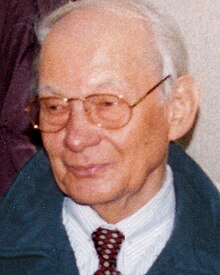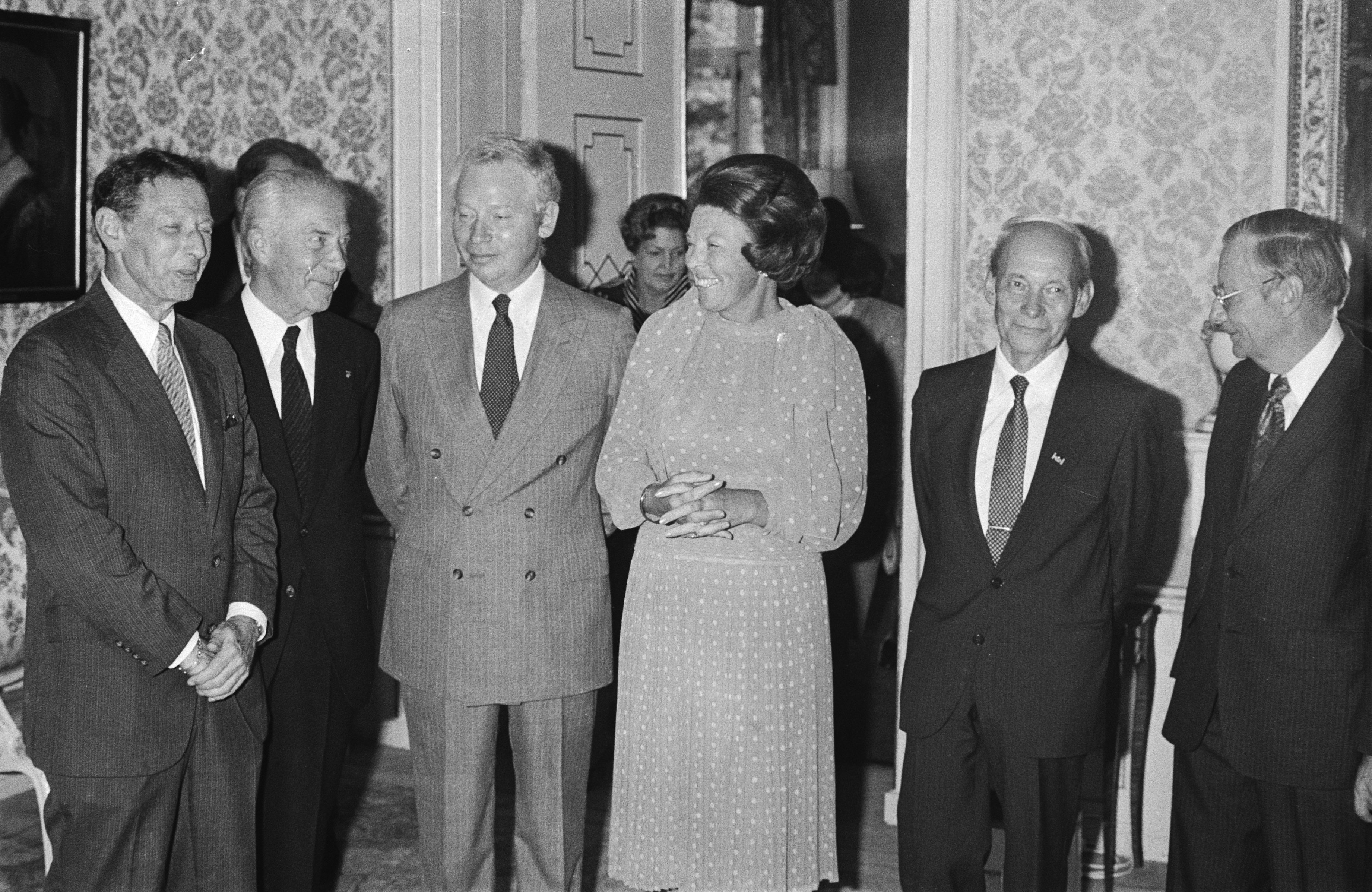Manfred Eigen
Manfred Eigen | |
|---|---|
 Manfred Eigen, Göttingen 1996 | |
| Born | 9 May 1927 (age 96)[4][5] |
| Nationality | German |
| Alma mater | University of Göttingen |
| Known for | |
| Awards |
|
| Scientific career | |
| Fields | Biophysical chemistry |
| Institutions | |
| Thesis | Ermittlung der molekularen Struktur reiner Flüssigkeiten und Lösungen aus thermischen und kalorischen Eigenschaften (1951) |
| Doctoral advisor | Arnold Eucken[3] |
| Doctoral students |
|
| Website | www |
 Manfred Eigen (born 9 May 1927) is a German biophysical chemist who won the 1967 Nobel Prize in Chemistry[1] for work on measuring fast chemical reactions.[6]
Manfred Eigen (born 9 May 1927) is a German biophysical chemist who won the 1967 Nobel Prize in Chemistry[1] for work on measuring fast chemical reactions.[6]
Education and early life
Eigen was drafted into the German Army at fifteen, serving in an anti-aircraft unit until being captured by the Russians at the end of the Second World War. After escaping from captivity, he walked to Göttingen and joined the first post-war cohort of students, despite never finishing his high school qualifications.[7]
Career and research
Eigen received his Ph.D. at the University of Göttingen[3] and is a former director of the Max Planck Institute for Biophysical Chemistry in Göttingen. He is an honorary professor of the Braunschweig University of Technology. From 1982 to 1993, Eigen was president of the German National Merit Foundation. Eigen is currently[when?] a member of the Board of Sponsors of The Bulletin of the Atomic Scientists.[8][9]
In 1967, Eigen was awarded, along with Ronald George Wreyford Norrish[10] and George Porter,[11] the Nobel Prize in Chemistry. They were distinguished for their studies of extremely fast chemical reactions induced in response to very short pulses of energy.
In addition, Eigen's name is linked with the theory of the chemical hypercycle, the cyclic linkage of reaction cycles as an explanation for the self-organization of prebiotic systems, which he described with Peter Schuster in 1977.[12][13][14][15] He founded two biotechnology companies, Evotec and Direvo.[citation needed]
In 1981, Eigen became a founding member of the World Cultural Council.[16]
Eigen is a member of the Pontifical Academy of Sciences even though he is an atheist.[17]
Honours and awards
Eigen has won numerous awards for his research including:
- Otto Hahn Prize (1962)[citation needed]
- Nobel Prize in Chemistry (1967), shared with Ronald George Wreyford Norrish and George Porter, for his studies on the kinetics of extremely fast running chemical reactions with relaxation methods[18]
- Member of the Soviet Academy of Sciences (now the Russian Academy of Sciences) (1976)
- Corresponding Member of the Bavarian Academy of Sciences and Humanities (1972)
- Elected a Foreign Member of the Royal Society (ForMemRS) in 1973[2]
- Faraday Lectureship Prize from the Royal Society of Chemistry in 1977[citation needed]
- Patron of the annual XLAB Science Festival in Göttingen[citation needed]
- Austrian Decoration for Science and Art
- Lower Saxony State Prize for Science (1980)[citation needed]
- Paul Ehrlich and Ludwig Darmstaedter Prize (1992)
- Helmholtz Medal (Berlin-Brandenburg Academy of Sciences and Humanities, 1994)
- Max Planck Research Award (1994), jointly with Rudolf Rigler of the Karolinska Institute[citation needed]
- Honorary member of the Ruhr University Bochum (2001)
- Honorary doctorate from Harvard University[citation needed]
- Lifetime Achievement Award from the Institute of Human Virology in Baltimore (2005)
- Wilhelm Exner Medal (2011).[19]
References
- ^ a b Weisskopf, V F; Eyring, H; Eyring, E M (1967), "Nobel Prizes: 4 named for international award (Hans Bethe, Manfred Eigen, R.G. Norrish, George Porter)", Science, vol. 158, no. 3802 (published Nov 10, 1967), pp. 745–8, Bibcode:1967Sci...158..745W, doi:10.1126/science.158.3802.745, PMID 4860395
- ^ a b "Professor Manfred Eigen ForMemRS". London: Royal Society. Archived from the original on 2015-11-17.
- ^ a b c d Manfred Eigen at the Mathematics Genealogy Project
- ^ "Manfred Eigen Festschrift: special issue dedicated to Professor Manfred Eigen on the occasion of his 60th birthday", Biophys. Chem., vol. 26, no. 2–3 (published May 9, 1987), pp. 101–390, 1987, PMID 3300802
- ^ Schlögl, R W (1997), "To Manfred Eigen on his 70th birthday", Biophys. Chem., vol. 66, no. 2–3 (published Jun 30, 1997), pp. 71–3, doi:10.1016/S0301-4622(97)00075-6, PMID 17029872
- ^ Winkler-Oswatitsch, R (1987), "Manfred Eigen. Scientist and musician.", Biophys. Chem., vol. 26, no. 2–3 (published May 9, 1987), pp. 109–15, doi:10.1016/0301-4622(87)80015-7, PMID 3300805
- ^ Czikszentmihalyi, Mihaly (2013). Creativity: The psychology of discovery and invention. Harper Perennial. p. 54.
- ^ "List of publications by Manfred Eigen", Biophys. Chem., vol. 26, no. 2–3 (published May 9, 1987), pp. 103–8, 1987, doi:10.1016/0301-4622(87)80014-5, PMID 3300804
- ^ "Curriculum vitae of Manfred Eigen", Biophys. Chem., vol. 26, no. 2–3 (published May 9, 1987), p. 102, 1987, doi:10.1016/0301-4622(87)80013-3, PMID 3300803
- ^ Dainton, F.; Thrush, B. A. (1981). "Ronald George Wreyford Norrish. 9 November 1897-7 June 1978". Biographical Memoirs of Fellows of the Royal Society. 27 (0): 379–424. doi:10.1098/rsbm.1981.0016. ISSN 0080-4606.
- ^ Fleming, G. R.; Phillips, D. (2004). "George Porter KT OM, Lord Porter of Luddenham. 6 December 1920 - 31 August 2002: Elected F.R.S. 1960". Biographical Memoirs of Fellows of the Royal Society. 50 (0): 257–283. doi:10.1098/rsbm.2004.0017. ISSN 0080-4606.
- ^ Eigen & Schuster (1977) The Hypercycle. A Principle of Natural Self-Organisation. Part A: Emergence of the Hypercycle. Naturwissenschaften Vol. 64, pp. 541–565.
- ^ Eigen & Schuster (1978) The Hypercycle. A Principle of Natural Self-Organisation. Part B: The Abstract Hypercycle. Naturwissenschaften Vol. 65, pp. 7–41.
- ^ Eigen & Schuster (1978) The Hypercycle. A Principle of Natural Self-Organisation. Part C: The Realistic Hypercycle. Naturwissenschaften Vol. 65, pp. 341–369.
- ^ Manfred Eigen and Peter Schuster The Hypercycle: A principle of natural self-organization, 1979, Springer ISBN 0-387-09293-5
- ^ "About Us". World Cultural Council. Retrieved November 8, 2016.
- ^ http://www.hanskrause.de/HKHPE/hkhpe_03_02.htm
- ^ "The Nobel Prize in Chemistry 1967 – Nobelprize.org". Retrieved 2 April 2013.
- ^ Editor, ÖGV. (2015). Wilhelm Exner Medal. Austrian Trade Association. ÖGV. Austria.
Bibliography
- Eigen (1971) Selforganization of matter and the evolution of biological macromolecules. Naturwissenschaften, Vol. 58, Nr. 10, pp. 465–523.
- Manfred Eigen, Ruthild Winkler: The Laws of the Game: How The Principles of Nature Govern Chance, 1983, Princeton University Press, ISBN 0-691-02566-5
- Manfred Eigen, "Molekulare Selbstorganisation und Evolution." (Self organization of matter and the evolution of biological macro molecules.) Naturwissenschaften 58 (10). 1971 pp. 465–523. In English. Influential theoretical paper on origin-of-life biochemistry.
- Biography of Manfred Eigen nobelprize.org
- Manfred Eigen tells his life story at Web of Stories (video)
- Manfred Eigen's homepage at the Max Planck Institute for Biophysical Chemistry
- Interview with Manfred Eigen by Harry Kroto, NL Freeview video provided by the Vega Science Trust.
- "Falls ein Gott die Naturgesetze erschuf, so erschuf er auch das Leben durch Evolution" (Ger) Interview with Manfred Eigen from 2004
- debate on theory and proof
- 1927 births
- Braunschweig University of Technology faculty
- Faraday Lecturers
- Foreign Members of the Royal Society
- Foreign Members of the Russian Academy of Sciences
- Foreign Members of the USSR Academy of Sciences
- Founding members of the World Cultural Council
- German biophysicists
- German Nobel laureates
- Living people
- Max Planck Society people
- Members of the European Molecular Biology Organization
- Members of the French Academy of Sciences
- Members of the Pontifical Academy of Sciences
- Members of the United States National Academy of Sciences
- Nobel laureates in Chemistry
- People from Bochum
- People from the Province of Westphalia
- German physical chemists
- Recipients of the Pour le Mérite (civil class)
- Studienstiftung alumni
- University of Göttingen alumni
- University of Göttingen faculty
- Recipients of the Austrian Decoration for Science and Art

